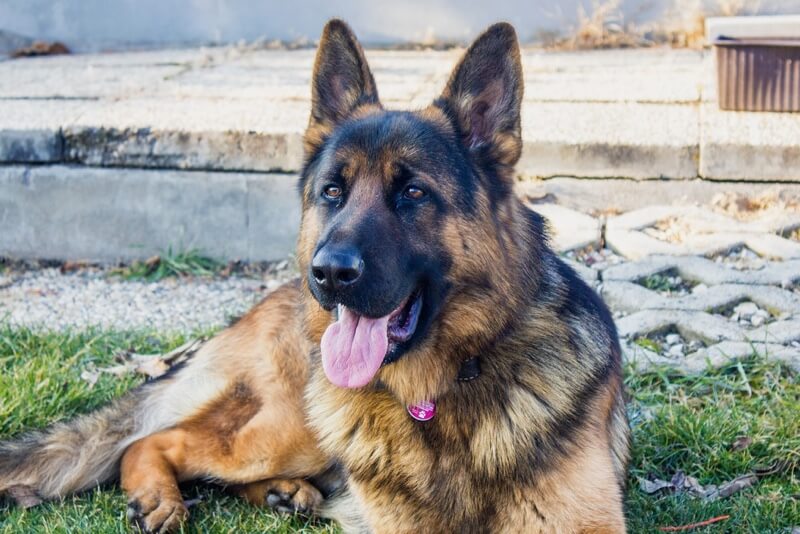Canine Parvovirus: Symptoms and Prevention
Learn how to recognize the signs and prevent this contagious viral infection.
Megaesophagus is a mouthful to say, but it is easy to understand when you break it down. Dogs who have megaesophagus have an enlarged (mega) esophagus. This disorder can cause issues from weight loss to aspiration pneumonia, and it needs to be treated by a veterinarian.
The esophagus is a muscular tube that connects the mouth and the stomach. It contracts to push food and water down into the stomach as part of the digestive process. With megaesophagus, it becomes enlarged and unable to do its job. This causes food and water to accumulate in the esophagus and eventually leads to regurgitation.
Megaesophagus can be a congenital condition that is present from birth. It is typically idiopathic, which means the cause is unknown. While any type of dog can have congenital megaesophagus, it is more prevalent in certain breeds, including:
Megaesophagus can also be acquired during a dog’s life. This form of the disorder is often idiopathic as well, but it can be brought on by health problems, such as neuromuscular disorders like myasthenia gravis or parasitic infections. In addition, it can occur when a dog ingests lead or thallium, which are heavy metals that cause the esophagus to become enlarged.
If you suspect your dog has been exposed to a toxic substance, you should contact your veterinarian or the ASPCA Animal Poison Control Center (APCC) right away. The APCC is available 24/7 by calling 1-888-426-4435. A consultation fee may apply when you call. However, a portion of that fee can be covered by an ASPCA Pet Health Insurance plan.

One of the most common symptoms of megaesophagus is regurgitating food or water.
Regurgitation is different than vomiting. When a dog vomits, the food or water is actively pushed out of the body. Vomiting also has warning signs, such as drooling, heaving, and retching. Dogs who regurgitate open their mouths and spill out the food or water they were trying to swallow without warning.
Other symptoms of megaesophagus include:
In addition, megaesophagus can cause aspiration pneumonia. This happens when bits of food stuck in the esophagus are inhaled into the lungs during the regurgitation process. It can result in trouble breathing, coughing, runny nose, fever, and rapid heart rate. Aspiration pneumonia can require hospitalization and treatments, such as antibiotics, fluid therapy, and oxygen.
To diagnose megaesophagus, your veterinarian will ask questions about your dog’s medical history and current symptoms. If megaesophagus is suspected, a chest X-ray or ultrasound will be done to examine the esophagus and lungs. Other diagnostic tests, such as blood work and a urinalysis, may also be performed to evaluate your dog’s health and rule out other illnesses.
In some cases, an esophagoscopy might be recommended. With this procedure, a thin tube with a light at the end is placed down into the esophagus while the dog is under anesthesia so the veterinarian can view the esophagus.

The first step to treating megaesophagus is to address the underlying cause if it is known. Otherwise, treatment is primarily supportive. For instance, you will need to watch for and treat respiratory infections quickly and make sure the dog gets a nutritious diet with enough calories to thrive.
In severe cases when dogs can’t eat on their own, a feeding tube might be necessary. Anti-nausea medications, antacids, and other medications can also help make the dog more comfortable.
Dogs diagnosed with megaesophagus can live relatively normal lives, but it takes extra effort and dedication to care for them. These tips can help you care for a dog with this disorder:
It is also useful to raise your dog’s food bowl with a step stool or put them in a Bailey chair at mealtimes. This is a special seat that holds your dog securely in a vertical position while they eat. It allows gravity to help pull the food or water down into the stomach. It might take some patience to get your dog used to sitting in the chair, but with some time and practice, they should start associating it with a yummy meal and jump right in.

Although it is more common in dogs, megaesophagus can occur in cats. If your cat is losing weight and regurgitating food, you should check with your veterinarian to see if this disorder is at the root of the problem. Diagnosis and treatment for megaesophagus in cats is the same as dogs.
While having a dog with megaesophagus can be worrisome, an ASPCA Pet Health Insurance plan can help you worry a little less about the costs of care. It can cover all sorts of treatments, including X-rays and other diagnostic tests, medications, and hospitalization. Get a quote for your dog now.
(opens new window)